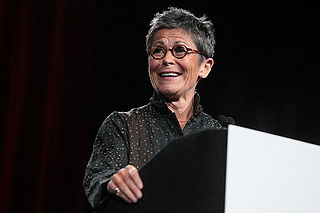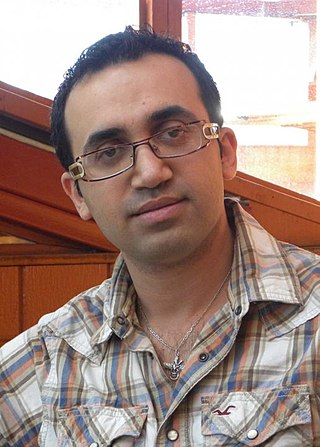Related Research Articles

Kate Clinton is an American comedian specializing in political commentary from a gay/lesbian point of view.

A dead end, also known as a cul-de-sac, or a no through road or no exit road, is a street with only one combined inlet and outlet.
A sexual inhibition is a conscious or subconscious constraint or curtailment by a person of behavior relating to specific sexual matters or practices, a discussion of sexual matters or viewing certain sexual material. To some extent such inhibitions may arise from cultural and social influences and conditioning, as well as from personal factors, including sexual orientation. In most partner relationships, the level of inhibition tends to decrease the higher the level of trust that develops between the partners. Such inhibitions also tend to decrease with improvements in a person's confidence in their sexuality. A person may take a drug, such as alcohol, to reduce their level of inhibition.

Lesbian, gay, bisexual, and transgender (LGBT) people in Iran face severe challenges not experienced by non-LGBT residents. Sexual activity between members of the same sex is illegal and can be punishable by death, and people can legally change their assigned sex only through sex reassignment surgery. Currently, Iran is the only country confirmed to execute gay people, though death penalty for homosexuality might be enacted in Afghanistan.
Mahmoud Asgari, and Ayaz Marhoni, were Iranian teenagers from the province of Khorasan who were publicly hanged on July 19, 2005. Iranian officials say the teenagers were executed for raping a 13-year-old boy, while gay rights groups claim they were executed for "being homosexual". The case attracted international media attention and the facts of the case are heavily debated.
Human rights in South Korea are codified in the Constitution of the Republic of Korea, which compiles the legal rights of its citizens. These rights are protected by the Constitution and include amendments and national referendum. These rights have evolved significantly from the days of military dictatorship to the current state as a constitutional democracy with free and fair elections for the presidency and the members of the National Assembly.
Ramin Jahanbegloo is an Iranian philosopher and academic based in Toronto, Canada.

Human rights in Armenia tend to be better than those in most former Soviet republics and have drawn closer to acceptable standards, especially economically. In October 2023, Armenia ratified the Rome statute, whereby Armenia will become a full member of the International Criminal Court.

Lesbian, gay, bisexual, and transgender (LGBT) people in Armenia face legal and social challenges not experienced by non-LGBT residents, due in part to the lack of laws prohibiting discrimination on the grounds of sexual orientation and gender identity and in part to prevailing negative attitudes about LGBT persons throughout society.

Lesbian, gay, bisexual, and transgender (LGBT) people in Azerbaijan face significant challenges not experienced by non-LGBT residents. Same-sex sexual activity has been legal in Azerbaijan since 1 September 2000. Nonetheless, discrimination on the basis of sexual orientation and gender identity are not banned in the country and same-sex marriage is not recognized.

Shadi Sadr is an Iranian lawyer, human rights advocate, essayist and journalist. She co-founded Justice for Iran (JFI) in 2010 and is the Executive Director of the NGO. She has published and lectured worldwide.

Lesbian, gay, bisexual, and transgender (LGBT) people are generally discriminated against in Libya. Homosexual activity is criminalised for both men and women within Libya, and homophobic attitudes are prevalent throughout the country. Since the fall of the Gaddafi regime in 2011, the discriminatory laws regarding homosexuality in Libya remain unchanged.

Arsham Parsi is an Iranian LGBT human rights activist living in exile in Canada. He is the founder and head of the International Railroad for Queer Refugees.

The Center for Women's Global Leadership, based at Rutgers University, was founded in 1989 by Charlotte Bunch, the former executive director and an internationally renowned activist for women's human rights. Executive Director Krishanti Dharmaraj is also the founder of the Dignity Index and co-founder of WILD for Human Rights and the Sri Lanka Children's Fund. The former executive director, Radhika Balakrishnan, is now the faculty director, and a professor in the Department of Women's and Gender Studies at Rutgers, chair of the Board of the US Human Rights Network, and a board member of the Center for Constitutional Rights. Located on Douglass Residential College at Rutgers University, CWGL is a unit of International Programs within the School of Arts and Sciences and is a member of the Institute for Women's Leadership, a consortium of women's programs at Rutgers.
Gay Days is a 2009 Israeli documentary film about the emergence of an LGBT community in Israel, starring major activists in Israel's cultural life and LGBT community: Gal Uchovsky, Eytan Fox, Ellyot, Amalia Ziv, Amit Kama and others and some rare archival footage from pride events, feature films and student films.

Cul-de-sac is a feature film produced by Ramin Goudarzinejad and Mahshad Torkan, Iranian human rights activists and filmmakers based in London. It premiered on 20 May 2010. The film is focused on the plight of homosexuals — in this case, lesbians — in Iran.
Sakineh Mohammadi Ashtiani is an Iranian woman convicted of conspiracy to commit murder and adultery. She gained international notoriety for originally being sentenced to death by stoning for her crimes. Her sentence was commuted and she was released in 2014 after serving nine years on death row.
Firouz may refer to:
Justice for Iran (JFI) is a London-based non-governmental human rights organization. The stated objective of the organization is to "address and eradicate the practice of human rights abuses and impunity that empowers officials of the Islamic Republic of Iran to perpetrate widespread human rights violations against Iranian citizens, and to hold them accountable for their actions."
References
- ↑ "Culdesac". Culdesacmovie.com. Retrieved 2014-05-28.
- ↑ "Lesbian Film Cul De Sac 2010 official movie trailer | One More Lesbian | Film, Television, and Video On Demand". One More Lesbian. 2010-04-16. Archived from the original on 2010-05-22. Retrieved 2014-05-28.
- ↑ Archived May 15, 2010, at the Wayback Machine
- ↑ "La Gran Bretagna concede asilo a Kiana Firouz, attrice lesbica iraniana - Panorama" (in Italian). Blog.panorama.it. 2010-06-17. Archived from the original on 2012-04-03. Retrieved 2014-05-28.
- ↑ "Refugees. EveryOne Group: Kiana Firouz, has been granted permission to remain in the UK". Everyonegroup.com. Archived from the original on 2018-10-21. Retrieved 2014-05-28.
- ↑ Archived April 10, 2010, at the Wayback Machine
- ↑ Archived April 10, 2010, at the Wayback Machine